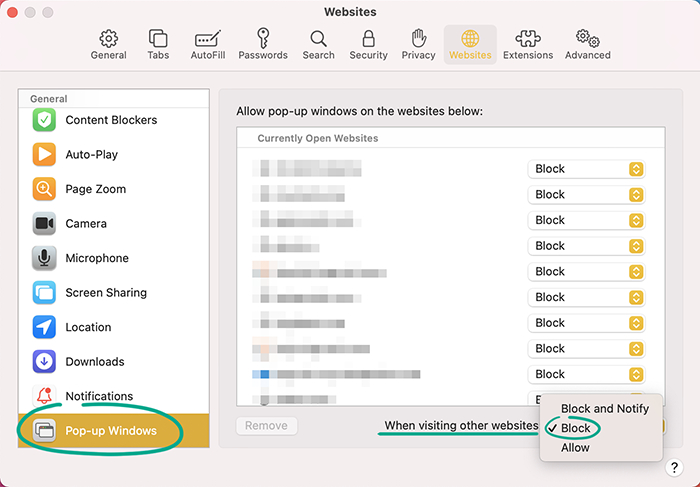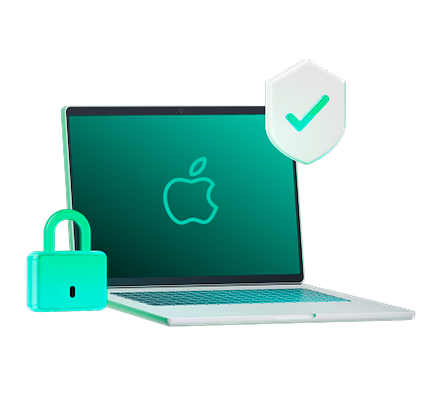How to protect yourself against malicious websites
What for: So cybercriminals do not get your data by fraudulent means.
Scammers often make copies of popular websites to steal user data. If you fail to spot a fake in time, your credentials or bank card details could wind up in cybercriminals’ hands.
By default, Safari protects against fake sites and warns users if a page is not genuine. Check the settings in case you or someone else in your family has disabled this feature.
- Click Safari in the upper left corner of the screen;
- In the drop-down menu, select Settings;
- Go to the Security tab;
- Make sure that the box next to Warn when visiting a fraudulent website is checked.

What for: To prevent cybercriminals from planting a Trojan on your computer.
The browser may automatically open some files considered safe right on downloading. These files include file archives, images, music, videos, and PDFs and other text documents. Attackers often hide malicious code in them. This code is then executed immediately after the file is opened. Disable this feature to protect yourself from such attacks.
- Click Safari in the upper left corner of the screen;
- In the drop-down menu, select Settings;
- Make sure that the box next to Open "Safe" Files After They Are Downloaded is unchecked.
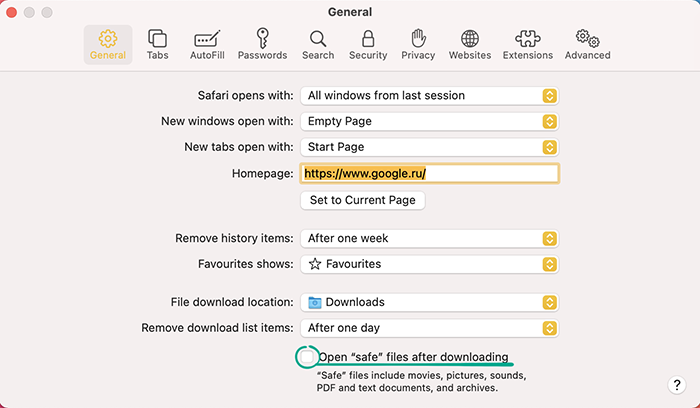
What for: To prevent Trojans and other malware from ending up on your computer.
By default, Safari asks for permission every time you want to download a file from a website. However, you can configure the browser to download files without additional confirmation. This may be convenient, but it makes it easier for malware to get onto your computer from a fraudulent page. Therefore, check the settings and restore the default value for this option, or completely block file downloading for all websites.
- Click Safari in the upper left corner of the screen;
- In the drop-down menu, select Settings;
- Go to the Websites tab;
- Open the Downloads section;
- Select Ask or Deny.
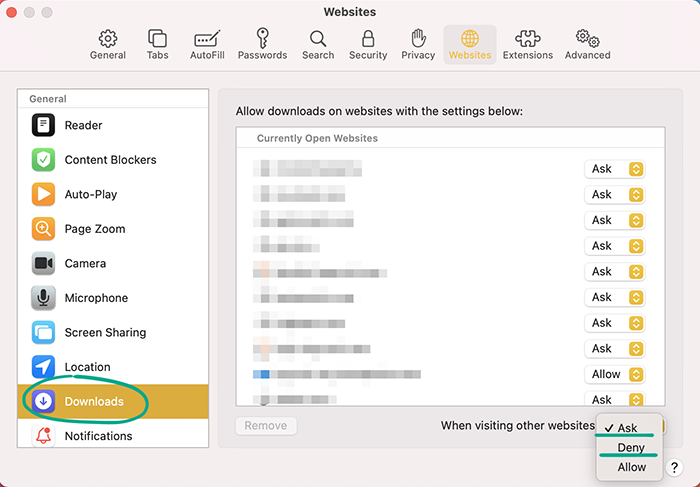
Downside: If you need to download something from the Internet, then you will have to grant the specific site permission in the Settings.
What for: To protect against vulnerabilities.
JavaScript is used to display interactive objects and animations, such as buttons and drop-down menus, on websites. Even though built into nearly all Web pages, this programming language contains plenty of well-known vulnerabilities. These are often abused by cybercriminals to steal personal data and infect computers with malware. Disable JavaScript to eliminate the risk.
- Click Safari in the upper left corner of the screen;
- In the drop-down menu, select Settings;
- Go to the Security tab;
- Uncheck the box next to Enable JavaScript.

Downside: Some website features will become unavailable, and some pages may work incorrectly.
How to hide your data from prying eyes
What for: Anonymous browsing.
The browser usually saves information about the pages you visit, the passwords you enter, the permissions you give, and some website data. If you want to hide these — for example, when using someone else's computer — browse in private mode. In this case, Safari won’t save your browsing and download history. Additionally, a separate session is created for each page, which means advertisers won’t be able to sniff out your online activity through trackers in other tabs.
To open a private window:
- Click File in the upper left corner of the screen;
- Select New Private Window.
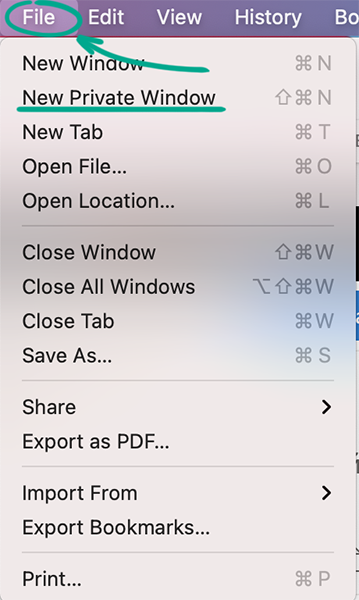
What for: To hide your favorite websites from prying eyes.
By default, when you open a new window, Safari loads all your Favorites tabs. This lets speeds up opening the websites you often visit. However, if you are in a public place, outsiders might see the list of these pages. To hide this information:
- Click Safari in the upper left corner of the screen;
- In the drop-down menu, select Settings;
- Go to the General tab;
- From the New windows open with menu, select Empty Page.
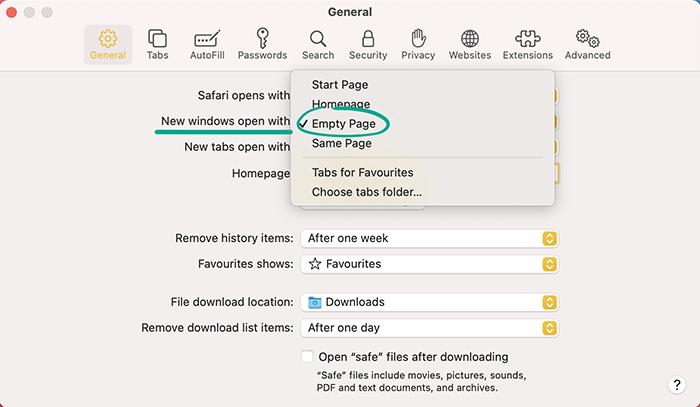
What for: To prevent strangers from finding out what sites you visit and what you download.
By default, Safari stores the history of the websites you visit and files you download throughout the year. If someone gains access to your computer, they will be able to see that information. You can set a shorter storage period for this data, such as one day, week, or month.
- Click Safari in the upper left corner of the screen;
- In the drop-down menu, select Settings;
- Go to the General tab;
- Select the desired option from the menu: Remove history items and Remove download list items.
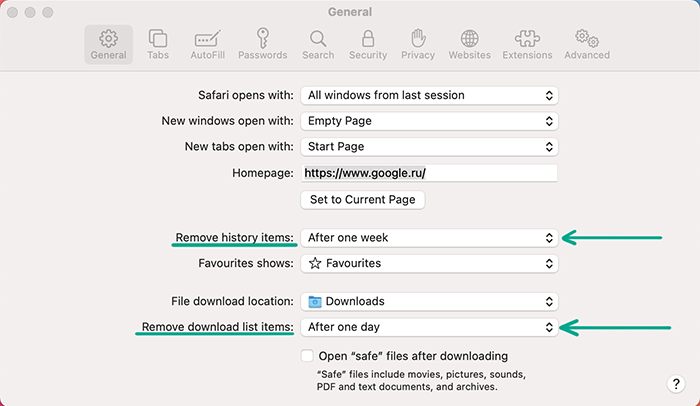
How to keep corporations out of your business
What for: So advertisers do not know which websites you visit.
Some websites use third-party cookies. They are placed by ad networks to track your online activity. You can ban websites from sharing this data with third parties.
- Click Safari in the upper left corner of the screen;
- In the drop-down menu, select Settings;
- Go to the Privacy tab;
- Check the box next to Prevent cross-site tracking.
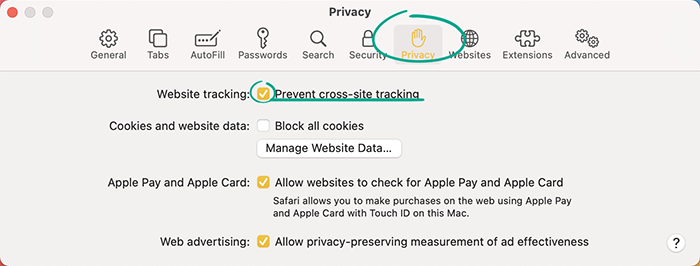
What for: So no one can eavesdrop or spy on you.
Websites can request permission to access your computer’s camera and microphone. For example, a technical support page can request such permission to enable voice chat with an expert. However, malicious websites can trick you into giving them this permission and then spy on you. To protect yourself, restrict access to your camera and microphone:
- Click Safari in the upper left corner of the screen;
- In the drop-down menu, select Settings;
- Go to the Websites tab;
- Open the Camera section and select Ask or Deny under the When visiting other websites option;
- Open the Microphone section and select Ask or Deny under the When visiting other websites option.
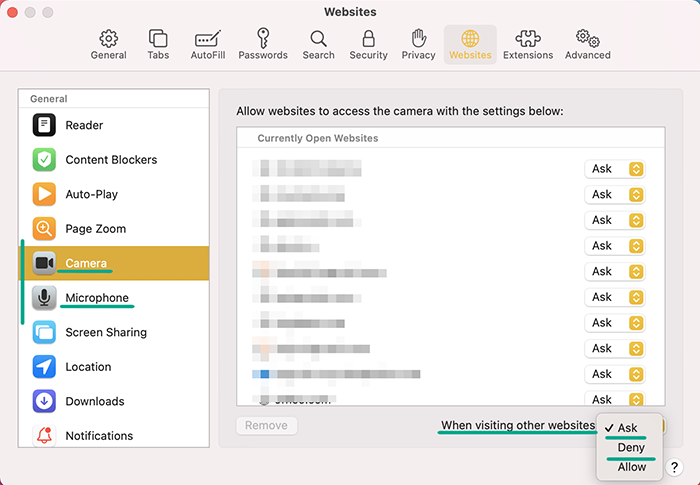
What for: To figure out who has tried to track you.
If you have blocked cross-site tracking, Safari will stop third-party websites from watching your actions on the page. At any time, you can view the list of resources having tried to spy on you.
- Open the page you want to check;
- Click the shield icon to the left of the URL;
- You will see a list of websites that have been blocked from tracking you on this page.

What for: So no one knows where you are.
Some websites may ask for permission to access your geolocation. For example, a delivery service page can request that to enter your address for you. By default, this permission is permanent, so when you visit the website again, it will learn where you are.
To avoid this, you can limit the permission to one day only, or ban websites from requesting geolocation.
To restrict location access when a website requests it, check the box next to Remember my decision for one day and click Allow.
To permanently ban websites from requesting geolocation:
- Click Safari in the upper left corner of the screen;
- In the drop-down menu, select Settings;
- Go the Websites tab and open the Location section;
- For When visiting other websites, select Deny.
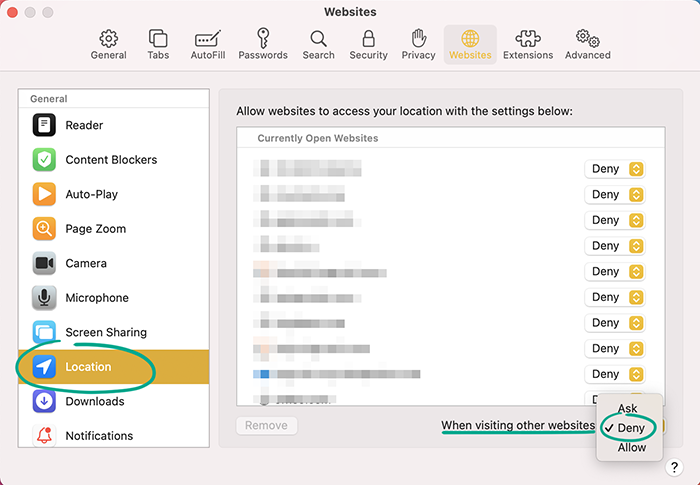
Downside: Having to enter your location by hand.
What for: To prevent search giants from gathering information about you.
Most search engines, such as Google or Bing, store user information and queries. This allows these companies to show customized search results and promote their services. However, there are services that do not collect any such data, e.g. DuckDuckGo. If you prefer to stay anonymous, you can assign this service as the default search engine.
- Click Safari in the upper left corner of the screen;
- In the drop-down menu, select Settings;
- Go to the Search tab;
- Find Search engine and select DuckDuckGo from the drop-down list.

What for: So marketers cannot build a profile of you.
When you visit a website, a small file gets saved on your computer. It contains information about the system and your actions on the page. Known as cookies, these files are used by websites to identify visitors and display personalized ads. For example, they might contain your username and password for a social network. In the browser settings, you can restrict how websites use cookies.
- Click Safari in the upper left corner of the screen;
- In the drop-down menu, select Settings;
- Go to the Privacy tab;
- Check the box next to Block all cookies.
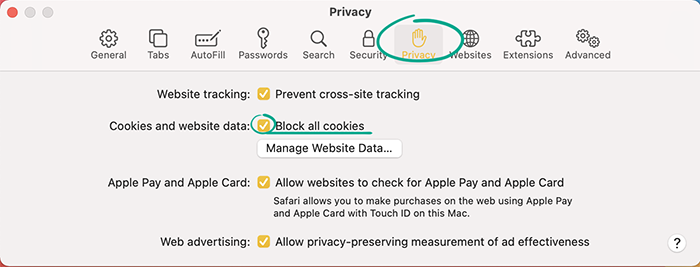
Downside: Having to enter your credentials and configure the settings each time you visit a website.
How to protect your data
What for: To protect against hacking.
When you sign in to a website, Safari prompts you to save your password. This lets you automatically enter your credentials on subsequent visits. In your browser settings, you can check the strength of saved passwords, and replace duplicate or weak ones.
- Click Safari in the upper left corner of the screen;
- In the drop-down menu, select Settings;
- Go to the Passwords tab and enter your computer password;
- If you use the same password for multiple sites, or the password you use is not strong enough, the browser will flag the corresponding resource with a warning icon;
- Click the warning icon and follow the link to replace the vulnerable password with a unique and strong one.
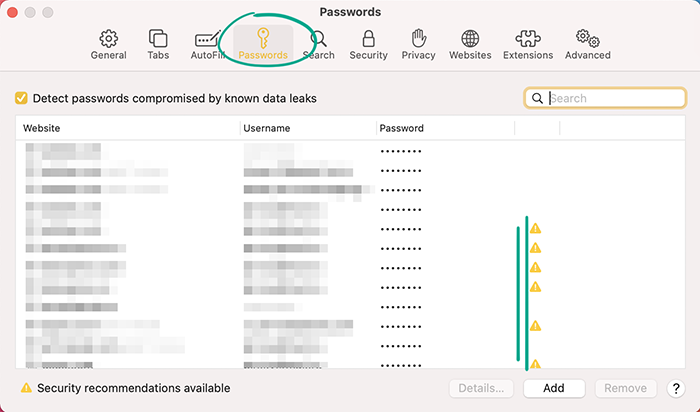
What for: So no one gains access to your accounts and money.
Safari can autofill credentials and contact/billing information that is saved in your browser. If someone gets hold of your computer, they will be able to log in to your account on a social network or pay for things even without knowing your username and password combinations or card number. To protect against such scenarios, turn off the autofill option.
- Click Safari in the upper left corner of the screen;
- In the drop-down menu, select Settings;
- Go to the AutoFill tab;
- Uncheck all the boxes.

To delete previously saved information:
- One by one, press Edit to the right of Usernames and passwords, Credit cards, and Other forms;
- Enter your computer password;
- Select the desired entry and click Delete in the bottom right corner of the window.
Downside: Having to enter credentials or card details every time you log in or buy something online.
You can avoid the inconvenience and improve the security of your accounts using a password manager. Unlike a browser, it does not access third-party resources on the Web, which means it is protected from malicious websites. Neither can it be hacked via a vulnerable extension or plug-in.
How to feel comfortable online
What for: To avoid distractions while web surfing or working.
Websites can send you in-browser notifications about new messages or posts etc. It is convenient, yet multiple notifications may distract you from work. Moreover, some dishonest developers may also use notifications for ads and spam. You can revoke previously given permissions to send notifications and stop websites from requesting them in the future:
- Click Safari in the upper left corner of the screen;
- In the drop-down menu, select Settings;
- Go the Websites tab and open the Notifications section;
- Find all the websites that are authorized to display notifications in the list and revoke the permission;
- To prevent websites from asking you for permission to display notifications, uncheck the box next to Allow websites to ask for permission to send notifications.
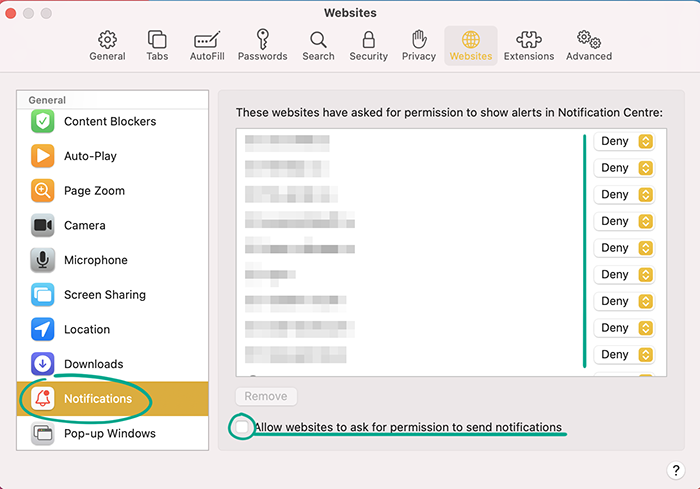
What for: To keep banners from distracting you.
Safari blocks intrusive ads by default, but you can enable them for specific websites in the Settings. If you enabled ads for a particular website by mistake, then you can disable them again:
- Open the websites where you want to block ads;
- Click Safari in the upper left corner of the screen;
- In the drop-down menu, select Settings;
- Go to the Websites tab;
- Open the Content Blockers section;
- You will see a list of websites you have opened. Select On next to the addresses you want.
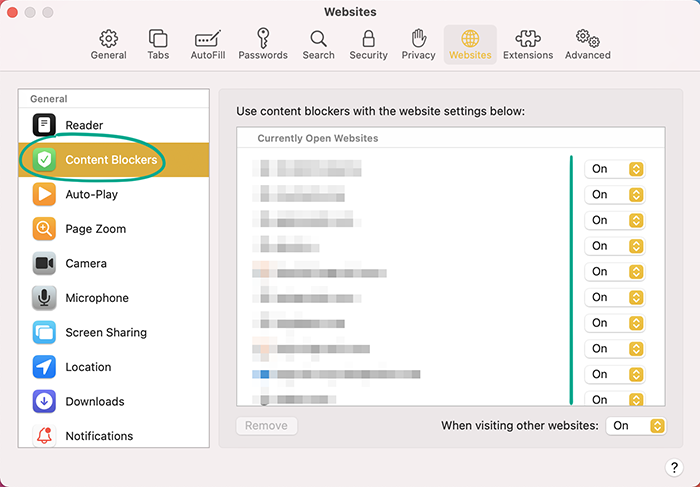
Note that you will not be able to get rid of ads completely. For example, Safari will always display Google Ads.
What for: To save traffic and avoid distractions.
Some websites automatically start playing videos as soon as you open a page. It saves you pressing the start button. However, if you are in a public place or on a limited network, this feature can be a pain. You can turn off automatic playback or mute it in the settings.
- Click Safari in the upper left corner of the screen;
- In the drop-down menu, select Settings;
- Go to the Websites tab;
- Open the Auto-Play section;
- For When visiting other websites, select Never Auto-Play.
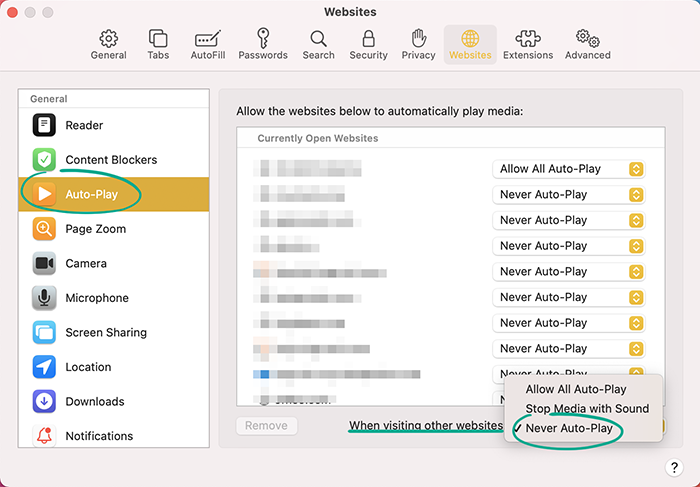
If you want to enable it on selected websites:
- Open the page where you want to enable automatic playback;
- Click Safari in the upper left corner of the screen;
- In the drop-down menu, select Settings;
- Go the Websites tab and open the Auto-Play section;
- Next to the website address, choose Allow All Auto-Play or Stop Media with Sound.
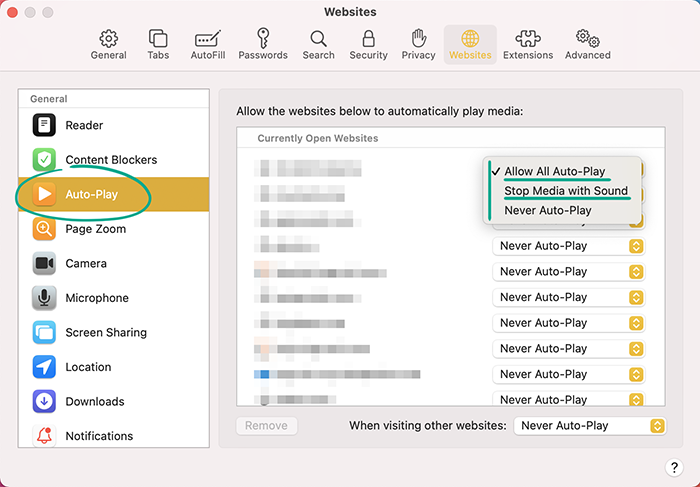
What for: Not to dig around in the settings when having problems with a single page.
You can fine tune individual websites without opening browser settings. This is handy if you need to change permissions or turn off notifications for a certain page, but do not want to alter the general settings.
- Open the website;
- Right-click the address bar and select Settings for This Website...;

- Configure the settings.

What for: To get rid of intrusive ads and messages.
By default, Safari asks for permission to show pop-ups if a website tries to open them. If these notifications bug you, you can turn off pop-ups for all websites in the settings.
- Click Safari in the upper left corner of the screen;
- In the drop-down menu, select Settings;
- Go to the Websites tab and open the Pop-up Windows section;
- You will see a list of resources authorized to display pop-up windows. If you want to revoke a permission, select Block next to the website;
- Select Block for When visiting other websites to block all other resources from asking for permission to show pop-up windows.
